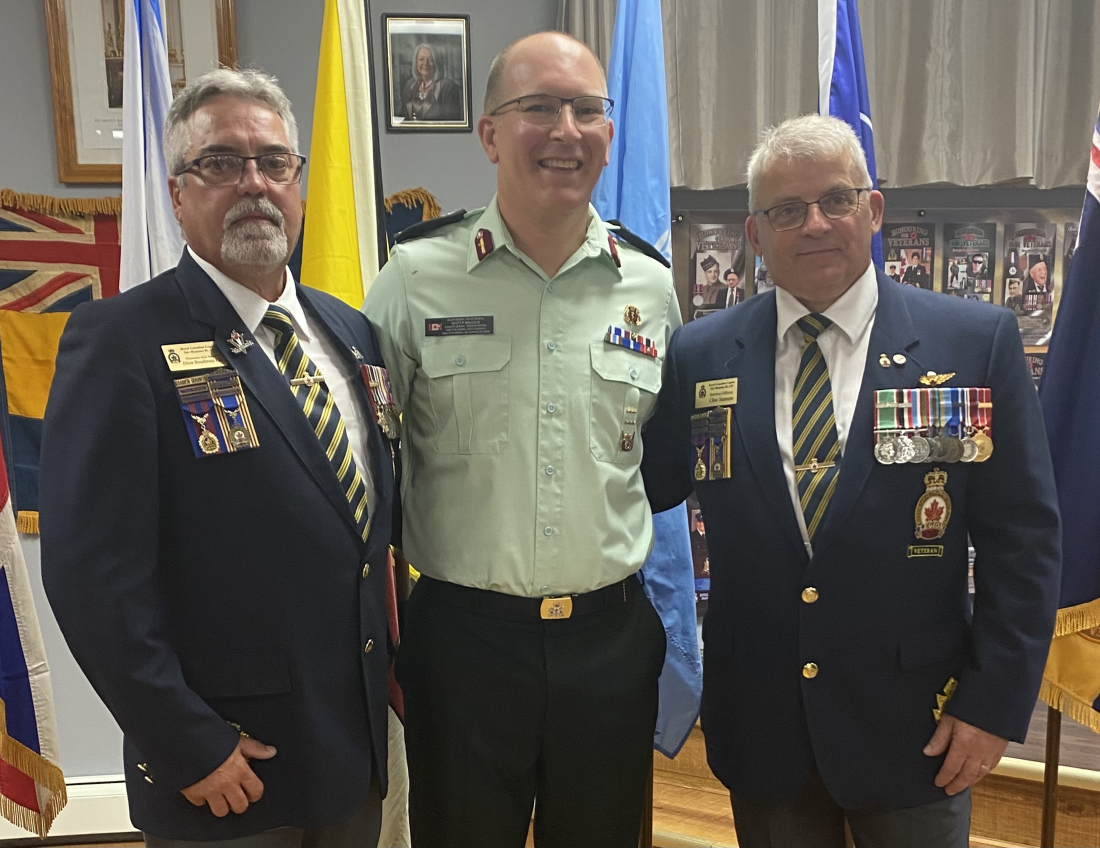
Major General Scott Malcolm, Surgeon General of the Canadian Armed Forces, was officially initiated as an honorary member of Royal Canadian Legion Branch 150 in Arichat on July 26—recognizing his achievement as the highest-ranking medical professional in the Canadian Armed Forces.
Following the ceremony, Major General Malcolm spoke with Civic Journalist Jake Boudrot.
This event marked a first in the history of the Isle Madame branch. Members of the Legion executive contacted the Civic Journalist about a month before the ceremony to coordinate coverage. Leading up to the event, during the day itself, and in the days after, the Civic Journalist stayed in touch with the branch to ensure the community knew when the coverage would air on Telile Community Television and be posted to YouTube.
Raised in Lower River, Malcolm graduated from the former Isle Madame District High in Arichat in 1993. Returning home for the ceremony, he spoke about the honour, reconnecting with family and friends, and seeing some of his former teachers and classmates.
After high school, Malcolm earned a scholarship to Harvard University, graduating in 1997. He joined the Canadian Military’s Medical Officer Training Plan in 1999 and graduated from Dalhousie Medical School in 2001. By 2003, he had completed his Family Medicine Residency at the University of British Columbia.
His early career included a posting to Canadian Forces Base Petawawa, a peacekeeping mission in Bosnia (2003–2004), deployment to Sri Lanka in January 2005 with the Disaster Assistance Response Team following the tsunami, and a tour in Afghanistan as Officer Commanding the Role 1 in Kandahar. Between 2008 and 2009, he returned to Afghanistan for seven-and-a-half months, providing primary care and medical support to combat operations alongside a team of doctors, medical technicians, and physician assistants.
From 2013 to 2014, Malcolm was deployed to Kabul as the physician team lead for the Operation Attention training mission. Trained as both a flight surgeon and advanced military diving medic, he served as Base Medical Officer in Kingston and Halifax, Regional Medical Officer for the Atlantic, and Medical Advisor to the Commander of the Royal Canadian Navy in Ottawa.
Promoted to Colonel in 2015, Malcolm became Director Force Health Protection before attending the Canadian Forces College National Security Program. In 2018, he took command of 1 Health Services Group in Edmonton. Upon returning to Ottawa in October 2019, he was appointed Director of Health Services Operations—just before the onset of the COVID-19 pandemic.
In July 2020, Malcolm became Deputy Chief Medical Officer and was seconded to the Public Health Agency of Canada from November 2020 to March 2021, serving as Medical Advisor to the Vice-President of Logistics and Operations to help coordinate the national COVID-19 vaccine rollout. He also led medical planning for the repatriation of Canadians from Wuhan, China, and from a cruise ship in Japan, as well as deployments into long-term care facilities in Quebec and Ontario during the pandemic’s first wave.
On June 25, 2021, Malcolm was promoted to Brigadier-General and appointed Commander of Canadian Forces Health Services in Ottawa. In 2023, he became Surgeon General of the Canadian Armed Forces.
During the interview, Malcolm reflected on his career, the importance of vaccination, and upcoming changes to the military health care system. He also shared advice for young people considering a similar path, encouraging them to serve with dedication, pursue education, and seize opportunities to make a difference.
Add new comment
About LJI
LJI Impact is the section of commediaportal.ca where the journalists and their organizations participating in CACTUS' Local Journalism Initiative can share their greatest successes.
Through the written stories, photos and videos you see in the LJI Impact section, you'll be able to read first hand accounts about how the presence of a community journalist is making a difference in communities across Canada through the Local Journalism Initiative and the Community Media Portal.
The Community Media Portal is a gateway to the audio-visual media created by community media centres across Canada. These include traditional community TV and radio stations, as well as online and new media production centres.
Community media are not-for-profit production hubs owned and operated by the communities they serve, established both to provide local content and reflection for their communities, as well as media training and access for ordinary citizens to the latest tools of media production, whether traditional TV and radio, social and online media, virtual reality, augmented reality or video games.
The Community Media Portal has been funded by the Local Journalism Initiative (the LJI) of the Department of Canadian Heritage, and administered by the Canadian Association of Community Television Users and Stations (CACTUS) in association with the Fédération des télévisions communautaires autonomes du Québec (the Fédération). Under the LJI, over 100 journalists have been placed in underserved communities and asked to produce civic content that underpins Canadian democratic life.








